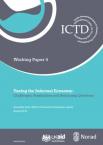ICTD Working Paper 30
The advance of decentralisation efforts in Africa has brought with it expanded discussion of local government taxation, and the potential for tax reform to spur broader state building and governance gains. However, while this literature has acknowledged the importance of local politics and context, it has remained largely grounded in a formal understanding of local tax systems, rather than an understanding of the often informal day-to-day realities of sub-national taxation. This paper correspondingly provides a ground level view of market and small business taxation in two local government areas in Ghana’s disadvantaged northern region. Doing so reveals a system shaped by ingrained informal practices that are grounded in existing social relationships and collective norms. These informal practices sometimes foster greater equity and responsiveness than formal rules, but in other cases serve to reinforce existing inequalities. We conclude by arguing that existing approaches to reform are likely to be undermined by a failure to appreciate the socially embedded realities of local government taxation, and we propose possible reform strategies that ‘work with the grain’ of existing practices.
